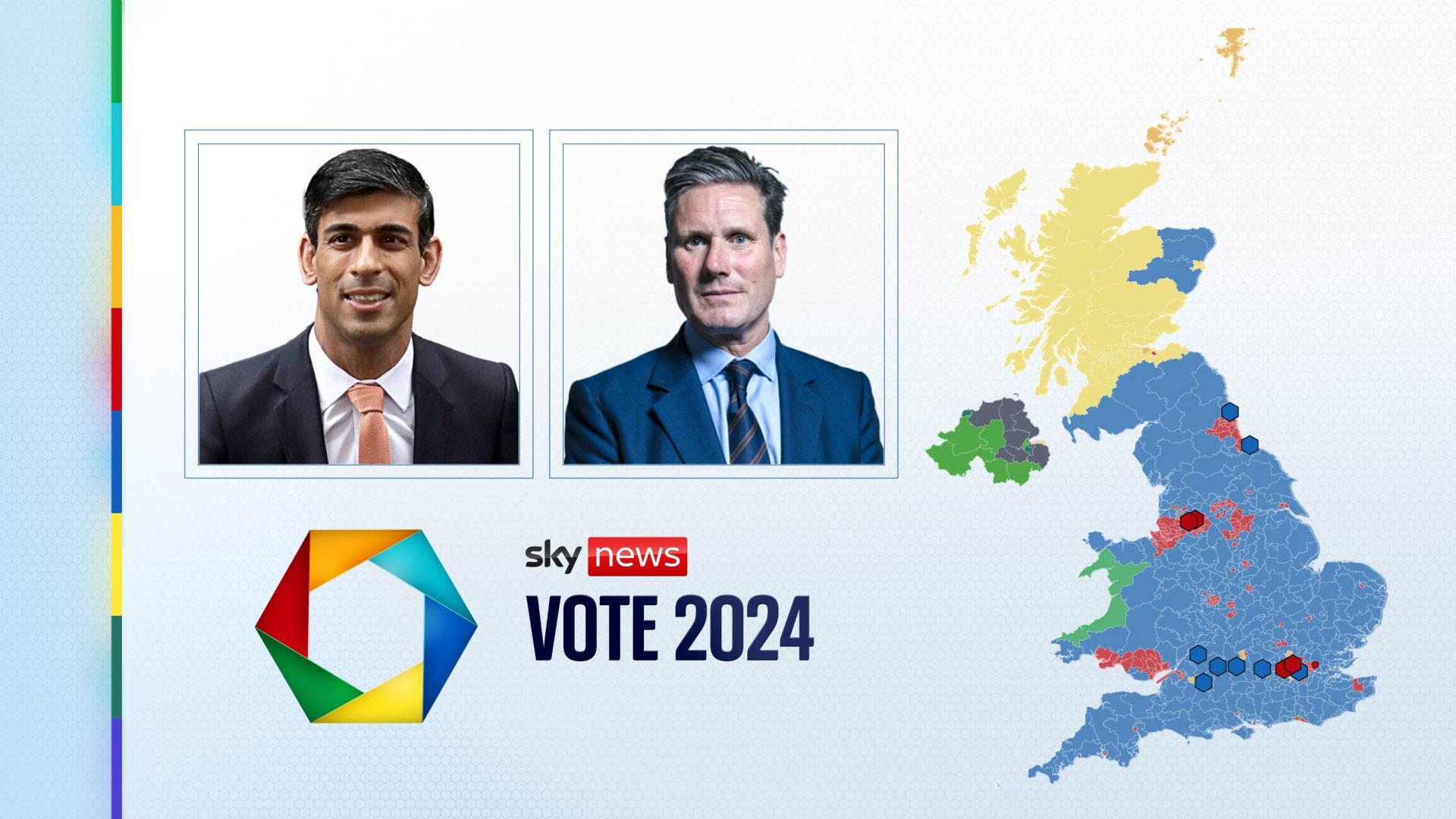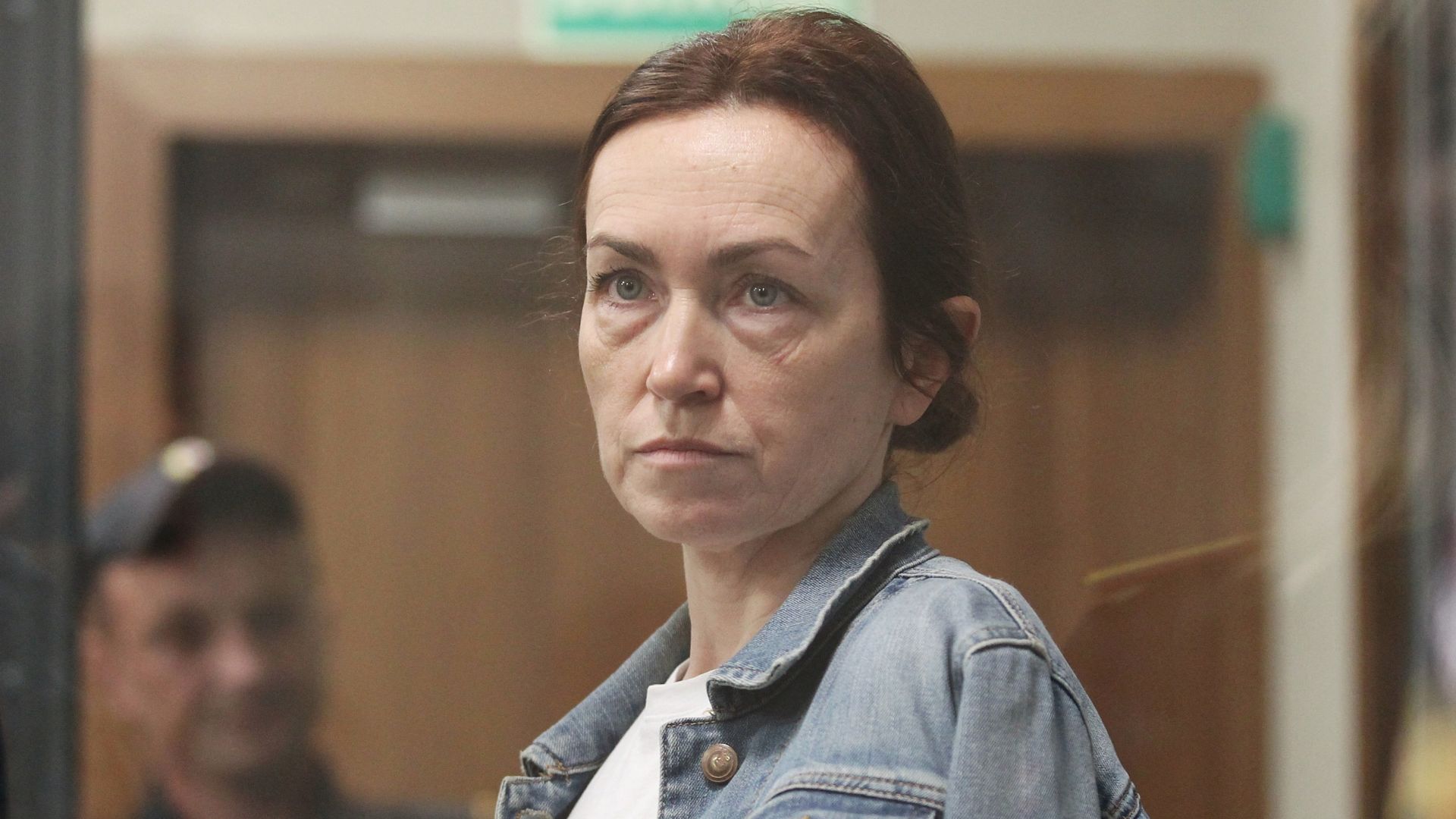Other events slowed the campaign this week, hurting Rishi Sunak more than Sir Keir Starmer. Both party leaders visited fewer but more marginal constituencies than last week.
Watch their journeys in our animated map below.
This campaign is being fought on new electoral boundaries, with many constituencies undergoing significant changes since 2019.
For the purposes of this analysis, we use notional results based on calculations by Colin Rallings and Michael Thrasher, Honorary Professors at the University of Exeter, which estimate the 2019 election seat results if they had taken place on the new constituency boundaries.
Battle buses are go
The first televised debate and commemoration of the 80th anniversary of D-Day means there’s been less time on the campaign road this week. Overall this has spelt trouble for Sunak, who faced widespread criticism for his “mistake” in leaving Normandy to return to the campaign early.
That wasn’t his only bit of bad news as the Sky/YouGov MRP poll released on Tuesday showed his party to be on course for a wipe-out, and his absence left room for Reform UK to drum up support at Nigel Farage’s rally.
While the prime minister and Starmer may have taken their campaigning foot off the gas this week, they kicked off Saturday by each launching a new battle bus.
In his first visit to the North East, Sunak chose the aptly-named Redcar to launch his blue bus. It’s not the first time its colourful name has been evoked. On election night in 2019, Boris Johnson claimed “we turned Redcar Blue-car” and it signalled a collapse for Labour in the Red Wall.
Just a 5.5 point swing is needed for Labour to take Redcar from the Conservatives. The Sky/YouGov MRP poll indicated its old MP, Labour candidate Anna Turley, is likely to achieve that. It seems it won’t be blue-car for long.
The prime minister then travelled to Blythe & Ashington. Its predecessor seat was the first Tory gain in 2019 but boundary changes now estimate it’s a Labour defence. There’s little prospect for Sunak to flip it as our MRP poll puts Reform UK in second place ahead of the Conservatives.
Starmer joined Labour deputy leader Angela Rayner to launch her own battle bus. They chose Boris Johnson’s old seat of Uxbridge & South Ruislip to start her 5,000 mile journey around the country. In a constituency where ULEZ may have cost them a 2023 by-election, there’s some irony in turning over the diesel engine for the first time here.
A calmer week with smaller majorities
Starmer’s pace of campaign visits slowed, hitting an average of 0.6 compared to 1.2 per day in the first week of the campaign. Sunak’s pace similarly halved, down from 2.2 visits a day to 1.1 this week.
Both main party leaders have ventured to more marginal seats in week two. Last week we showed the Conservatives in deep defensive territory where the average majority they were defending was 23.5%. This week that’s dropped to 18.1%, but the Sky/YouGov MRP poll still suggests all but one will fall to either Labour or the Liberal Democrats, while the remaining Conservative seat, Melksham & Devizes, is a toss-up that could go either way.
Of those won by the Conservatives in 2019, the average majority that Labour would have to overturn in the target seats they visited last week was 19.5%. Whereas the average between the three stops this week is a more modest 8.1%.
The leader that bucks this trend is Sir Ed Davey. All nine of his visits last week were Conservative-held targets with an average majority of 15.6%. That jumped to 25.3% this week but the Tories are in such dire straits that the MRP poll suggests these are winnable targets for Davey’s party. His stop in Shropshire North on Tuesday, where the Liberal Democrats came third in 2019, shows his campaign to be just as much about message as it is about gaining an MP.
It demonstrates the scale of the challenge for the Lib Dems, who have only 16 target seats that require less than 5 point vote swing.
Regional battlegrounds
There are now 54 of the 650 seats that have been visited during the campaign by Sunak, Starmer or Davey.
The South East seems to be garnering the most attention with 12 visits overall. This highlights the importance of the region for all of the English parties. There are 91 constituencies here, including the Greens’ only seat of Brighton, and a swathe of Liberal Democrat targets.
Eighty-one of these 91 seats were won by the Conservatives in 2019. The Sky/YouGov MRP poll suggests this number could be slashed by more than half, leaving them with 37 seats. The majority (28) could go to Labour, the poll suggests, and the rest to the Lib Dems.
This is by no means the most devastating regional outcome for the Conservatives, who could potentially be completely wiped out in the North East and North West.
As with any poll, there is uncertainty attached to these numbers, and it only reflects voter attitudes at the time that they were polled – from the 24th May to 21st of June, before Nigel Farage re-entered the race.
The absence of the main protagonists from the campaign trail this week let Farage dominate the news coverage. Supporters of the Conservative’s electoral threat gathered in Clacton where Reform’s Nigel Farage hopes to repeat UKIP’s only general election success.
While Sunak has visited all regions at least once, there are four regions which Starmer is yet to reach. The Labour leader hasn’t been to the North East, South West, Yorkshire & The Humber or Northern Ireland. He finishes his campaigning week in London, a region he’s visited three times – a joint favourite with the North West and South East.
Neither main party leader made it to Scotland this week, but SNP leader John Swinney visited at least five constituencies north of the border. Two of these they’re expected to hold, but three are considered toss-ups in our MRP. The party launched their battle bus from Glasgow North, a constituency with a 13.4% SNP majority that could still be gained by Labour.
The prime minister headed back to the South West on Friday, making it his most visited region. He stopped by three constituencies, and visited another four in the previous week.
So far, Work and Pensions Secretary Mel Stride in Devon Central is the only cabinet member to have hosted the prime minister, suggesting that he might be considered more of a hindrance than a help to their re-election chances.
Many of the cabinet are fighting close battles, with 12 of the 26 who are standing at the election projected to potentially lose their seats in the Sky/YouGov MRP Poll.
The three constituencies of Wimbledon, Bury, and Harpenden & Berkhamsted have racked up the most visits so far, with Sunak and Davey spending time in both Wimbledon and Harpenden, and Sunak and Starmer visiting Bury North. They are all Conservative seats, two with majorities smaller than 2.5%. Wimbledon is third on the Liberal Democrats targets list, Bury North placing seventh on Labour’s.
Dr Hannah Bunting is a Sky News elections analyst and Co-director of The Elections Centre at the University of Exeter.
The Data and Forensics team is a multi-skilled unit dedicated to providing transparent journalism from Sky News. We gather, analyse and visualise data to tell data-driven stories. We combine traditional reporting skills with advanced analysis of satellite images, social media and other open source information. Through multimedia storytelling we aim to better explain the world while also showing how our journalism is done.






